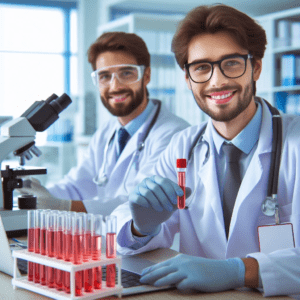Bachelor of Vocation (B.Voc) in Medical Laboratory Technology (MLT) is a specialized undergraduate program designed to train students in various aspects of laboratory testing, analysis, and management within the field of healthcare. This program equips students with the knowledge, skills, and practical experience necessary to work in medical laboratories, diagnostic centers, hospitals, research institutions, and other healthcare settings. Below is a detailed description of the program:
- Duration: The B.Voc program in Medical Laboratory Technology typically spans three years, divided into semesters.
- Curriculum: The curriculum covers a wide range of subjects related to medical laboratory science, including clinical biochemistry, hematology, microbiology, immunology, pathology, and molecular diagnostics. Students learn about laboratory techniques, instrumentation, quality assurance, safety protocols, and ethical considerations in laboratory practice.
- Practical Training: Emphasis is placed on hands-on training through laboratory practical sessions, clinical rotations, internships, and supervised practicum in medical laboratories. Students gain practical experience in specimen collection, processing, analysis, interpretation of results, and reporting under the guidance of experienced laboratory professionals.
- Specializations: Some B.Voc programs offer specializations or elective courses in specific areas of medical laboratory technology, such as clinical chemistry, hematology, microbiology, immunology, histotechnology, cytotechnology, or molecular diagnostics, allowing students to focus on their areas of interest.
- Certifications: Upon completion of the program, students may be eligible to obtain certifications such as Medical Laboratory Technician (MLT) or Clinical Laboratory Scientist (CLS) through professional certifying bodies to enhance their employability and professional recognition.
- Core Subjects:
– Clinical Biochemistry
– Hematology and Coagulation Studies
– Microbiology and Immunology
– Clinical Pathology and Urinalysis
– Blood Banking and Transfusion Medicine
– Histotechnology and Cytotechnology
– Molecular Diagnostics
– Laboratory Management and Quality Assurance
– Medical Ethics and Legal Issues in Laboratory Practice - Specialization Electives (Sample):
– Clinical Chemistry
– Hemostasis and Thrombosis
– Medical Microbiology
– Immunohematology
– Clinical Immunology
– Molecular Biology Techniques
– Cytogenetics and Molecular Pathology
– Histopathology and Cytopathology - Laboratory Techniques and Instrumentation:
– Specimen Collection and Processing
– Microscopic Examination
– Biochemical Analysis
– Hematological Analysis
– Microbiological Culture and Sensitivity Testing
– Immunological Assays
– Molecular Diagnostic Techniques
– Blood Banking Procedures
– Histological and Cytological Staining Techniques - Clinical Training Modules:
– Clinical Rotations in Hospital Laboratories (Clinical Chemistry, Hematology, Microbiology, Blood Bank)
– Internship in Reference Laboratories or Diagnostic Centers
– Supervised Practicum in Specialized Areas (Histopathology, Cytology, Molecular Diagnostics)
– Quality Assurance and Quality Control Procedures
– Laboratory Safety Protocols and Infection Control Measures
– Professional Communication and Interdisciplinary Collaboration
- Laboratory Techniques: Proficiency in performing a wide range of laboratory tests, using laboratory equipment and instruments, and following standard operating procedures (SOPs) and safety protocols.
- Analytical Skills: Ability to analyze laboratory results, interpret findings, troubleshoot technical issues, and provide accurate and reliable diagnostic information to healthcare providers.
- Critical Thinking: Evaluating test results, identifying abnormalities or inconsistencies, and determining appropriate follow-up actions or additional testing as needed.
- Attention to Detail: Ensuring accuracy, precision, and reliability in specimen processing, data recording, and result reporting to maintain high-quality laboratory services.
- Time Management: Prioritizing tasks, managing workload, and meeting turnaround time requirements for specimen analysis and result reporting in a fast-paced laboratory environment.
- Communication Skills: Communicating effectively with healthcare professionals, laboratory staff, patients, and external stakeholders to exchange information, clarify test requests, and coordinate patient care.
- Teamwork and Collaboration: Collaborating with multidisciplinary healthcare teams, including physicians, nurses, pharmacists, and other allied health professionals, to optimize patient care and treatment outcomes.
- Ethical and Professional Conduct: Adhering to ethical principles, confidentiality guidelines, and regulatory standards governing laboratory practice, patient confidentiality, and data security.
- Medical Laboratory Technician (MLT): Performing laboratory tests, analyzing specimens, and reporting results under the supervision of laboratory technologists or pathologists in hospitals, clinics, or diagnostic centers.
- Clinical Laboratory Technologist: Conducting complex laboratory tests, interpreting results, verifying data accuracy, and performing instrument maintenance and troubleshooting in hospital laboratories or reference laboratories.
- Blood Bank Technologist: Screening blood donors, testing blood samples for compatibility, preparing blood components, and managing blood inventory in blood banks and transfusion services.
- Microbiology Technologist: Culturing microorganisms, performing antimicrobial susceptibility testing, and identifying infectious agents in clinical specimens in microbiology laboratories.
- Histotechnologist or Cytotechnologist: Processing tissue samples, preparing histological or cytological slides, staining specimens, and assisting pathologists in the diagnosis of diseases in histopathology or cytology laboratories.
- Molecular Technologist: Performing molecular diagnostic tests, such as PCR, DNA sequencing, and genetic analysis, to detect genetic disorders, infectious diseases, and cancer biomarkers in molecular diagnostic laboratories.
- Laboratory Manager or Supervisor: Overseeing laboratory operations, personnel management, quality assurance, regulatory compliance, and strategic planning in medical laboratories or diagnostic centers.
B.Voc in Medical Laboratory Technology is a specialized program that prepares students for rewarding careers as laboratory professionals in healthcare. By providing a comprehensive curriculum, hands-on training, and opportunities for specialization, the program equips graduates with the knowledge, skills, and professional competencies needed to perform laboratory tests, analyze specimens, and contribute to accurate diagnosis and treatment of diseases. With a focus on quality assurance, patient safety, and continuous learning, graduates are well-prepared to work in various laboratory settings and make a positive impact on patient care and public health.
